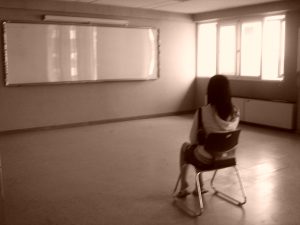
The first couple months of virtual learning were the hardest for economics Major Yanga Same. Her mother barred her from going outside and she couldn’t see her friends.
“I was cooped up inside every day and the only social interaction aside from family was my classmates on Zoom,” said Same. “It made me appreciate class a lot more during the first virtual semester.”
During the second semester of virtual learning, when Same began procrastinating, she tried to fend off pandemic ennui with a night shift job at Amazon.
By the third semester, isolation took its toll.
“Right now, I’m only taking one class and even that is like hard to get to class even in the afternoon,” said Same. “I still go so the professor doesn’t feel bad. It’s so silent in class you can feel the other student’s lack of motivation to even type on their keyboards.”
For some students, the pandemic exacerbated already existing mental health concerns. For others, pandemic-related stressors led to changes in mood, motivation, and functioning.
“I didn’t want to associate with any other school people outside of class,” said Same.” I was mentally out of it and usually spent my free time sleeping, watching YouTube and at my job.”
Same’s pandemic experience is a common one. Roughly 60% of students, age 18 to 25, felt high levels of loneliness since the pandemic began, according to research from Making Caring Common.
“Students have reported an increase in overall levels of anxiety, depression, and isolation,” said Martin Pino, director of Counseling & Wellness Services at Hunter. “particularly attributable to COVID-related factors, such as remote learning, financial stress, grief, and feelings of isolation and loneliness.”
When Hunter College first announced plans to switch to virtual learning, Q’Shaa Pollock, a Journalism and English double major, was relieved. Pollock lives with two immunocompromised housemates.
“I did go through a period where I was isolated, where I felt by myself and like I had nobody,” said Pollock. “I had to disconnect from my family that lived outside my house.”
When Pollock’s workplace failed to uphold COVID safety regulations by ignoring maximum capacity and banning employees from wearing masks, she left so she would not be exposed to the coronavirus.
“My interactions with people were really limited,” said Pollock, who has struggled with mental health issues since she was 5. “I just had to figure out how to get by.”
She says her pandemic loneliness came in waves. Wave one was depression. Wave two was staying in bed and isolating herself from others. Wave three was a loss of motivation to attend class.
“I personally thought it would be easier for me to get to class because, hello, it’s online all you have to do is roll over and get on,” said Pollock. “But it was actually really, really hard for me to get to class during that time. Being lonely led me to be in a deep depression. I just didn’t want to do anything.”
Although Pollock managed to make some friends through Hunter forums, she expects them to be short-lived, spurred only by temporary pandemic loneliness.
“I feel like a lot of people, especially college students. We are alone and we are dealing with a lot and so we just kind of leaned on each other,” said Pollock. “We still are leaning on each other to cope and help each other out and give each other advice about situations.”
For Pollock, the challenge is not in sustaining relationships, but maintaining them.
“I think the loneliest I felt was the two months I went without seeing my family,” said Pollock. Though her family lived only thirty minutes away, Pollock was unable to be with them.
Last year, Pollock’s mother caught COVID and was hospitalized on the week of Easter. She had to step up and take care of the family.
She relied on skills learned in therapy to cope.
“I actually got out of therapy during the pandemic because I felt like I was able to handle my issues properly. I feel like I was very strong-minded, and I could cope well with the things that were going on,” said Pollock. “My therapist prepared me for what’s to come.”
Sam Bodamer, age 32, transferred to Hunter College last Spring hoping she would finally have the university experience she always wanted.
“For me it’s been a really big deal to get into university,” said Bodamer. “I heard that Hunter was switching online, and I knew it was going to be my first semester, I was obviously really bummed. I was like ‘Oh, I don’t get to have this experience that I always wanted it and dreamt of.’”
Bodamer lives with her spouse, and although she is never physically lonely, Bodamer felt isolation in other ways.
“Before I got out of my comfort zone, I was feeling really disconnected from everything,” said Bodamer. “I was new to Hunter but had no way to put myself out there at first.”
Bodamer pushed herself to pursue friendships with classmates and become involved in a literature club outside of CUNY. Soon, her loneliness faded.
“I’m the introverted extrovert. Being able to be with somebody but not really with you is kind of perfect for me,” said Bodamer.
Students looking for help can also reach out to NYC-Well or the CUNY Crisis Text Line (Text “CUNY” to 741741) for support.

